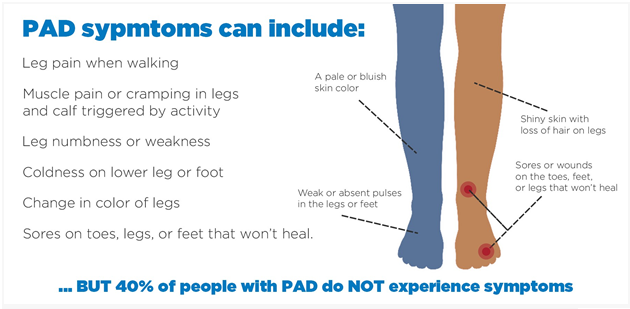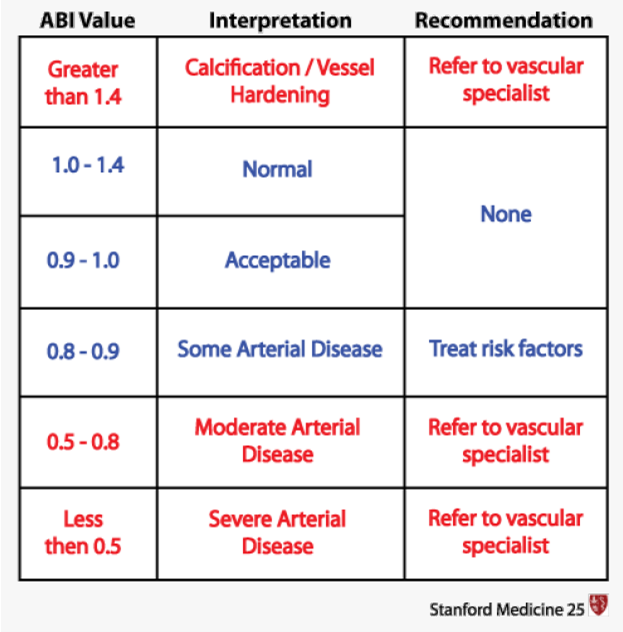The nurse is teaching a client with peripheral arterial disease. Which information should the nurse include in the teaching plan?
Soak feet in warm water for an hour each day
Set heating pads on a low temperature.
Use callus remover for corns or calluses
Wear fitted closed toe shoes daily.
The Correct Answer is D
Wear fitted closed toe shoes daily: It is important for clients with peripheral arterial disease to wear properly fitted closed toe shoes. This helps protect the feet from injury and provides support. Closed toe shoes also help maintain warmth and prevent heat loss, which is especially important for individuals with impaired circulation.
Let's review the other options and explain why they may not be appropriate:
Soak feet in warm water for an hour each day: Soaking the feet in warm water for a prolonged period can actually worsen symptoms in individuals with peripheral arterial disease. It can cause further dilation of blood vessels, leading to increased blood pooling and potential tissue damage. Therefore, soaking the feet for extended periods of time is not recommended.
Set heating pads on a low temperature: Using heating pads, especially at high temperatures, can be harmful to individuals with peripheral arterial disease. It can increase the risk of burns or thermal injury due to reduced sensation in the affected areas. Heating pads should be used with caution and on a low temperature setting, if necessary.
Use callus remover for corns or calluses: Individuals with peripheral arterial disease have reduced blood flow to the lower extremities, which can impair wound healing. It is important to avoid self-treatment of corns or calluses, as it can increase the risk of skin breakdown and infection. Clients should be advised to consult a healthcare professional, such as a podiatrist, for appropriate management of corns and calluses.

Nursing Test Bank
Naxlex Comprehensive Predictor Exams
Related Questions
Correct Answer is C
Explanation
The most important finding to report to the health care provider would be the serum potassium level of 3.0 mEq. This is an extremely low potassium level (normal range is typically 3.5-5.0 mEq/L), which can indicate a potentially life-threatening condition called hypokalemia. Furosemide (Lasix) is a diuretic medication that can cause potassium loss in the urine, and a low potassium level can lead to serious cardiac and muscle abnormalities. It is crucial to report this finding promptly to the health care provider for appropriate intervention and monitoring.
Blood glucose level of 175 mg/dL: While an elevated blood glucose level can be a concern, especially for individuals with diabetes, it is not the most critical finding in this situation. The client's primary concern is hypertension, and the administration of IV furosemide is aimed at managing blood pressure. The elevated blood glucose level should still be addressed and monitored, but it is not as urgent as the low potassium level.
Orthostatic systolic BP decrease of 12 mm Hg: Orthostatic hypotension refers to a significant decrease in blood pressure upon standing up. While it is important to assess and manage orthostatic changes, a decrease of 12 mm Hg in systolic blood pressure alone may not be considered clinically significant. It could be a normal response for some individuals. However, if the client experiences symptoms such as dizziness or lightheadedness upon standing, further evaluation may be necessary. Nonetheless, it is not as urgent as the low potassium level.
Current blood pressure reading of 166/94 mm Hg: While this blood pressure reading indicates hypertension, it is not the most critical finding to report in this situation. The nurse is preparing to administer furosemide (Lasix), which is a medication commonly used to treat hypertension. It is expected that the blood pressure will be high before administering the medication. The goal is to monitor the blood pressure after the administration to assess the effectiveness of the medication.
Correct Answer is D
Explanation
An ABI of 0.89 indicates a reduced blood flow to the lower extremities, which is suggestive of peripheral arterial disease (PAD). In PAD, there is narrowing or blockage of the arteries that supply blood to the legs and feet. Medications like clopidogrel and simvastatin are commonly prescribed for individuals with PAD to manage the condition and reduce the risk of complications.

Here's an explanation of why the other options are not the most appropriate interventions:
Document the information as a normal finding: An ABI of 0.89 is not considered a normal finding. An ABI value below 0.9 is generally indicative of PAD or reduced blood flow to the lower extremities.
Prepare the client for an arterial bypass: An ABI value of 0.89 alone does not warrant immediate preparation for an arterial bypass. Arterial bypass surgery is typically considered for severe cases of PAD with significant symptoms that significantly impact the client's quality of life and other conservative treatments have not been successful.
Educate the client about the use of compression stockings: While compression stockings may be a part of the overall management of PAD, the ABI result alone does not indicate an immediate need for education about compression stockings. Other interventions, such as medication management, lifestyle modifications, and possibly revascularization procedures, may be more appropriate based on the severity of the PAD.
Whether you are a student looking to ace your exams or a practicing nurse seeking to enhance your expertise , our nursing education contents will empower you with the confidence and competence to make a difference in the lives of patients and become a respected leader in the healthcare field.
Visit Naxlex, invest in your future and unlock endless possibilities with our unparalleled nursing education contents today
Report Wrong Answer on the Current Question
Do you disagree with the answer? If yes, what is your expected answer? Explain.
Kindly be descriptive with the issue you are facing.
